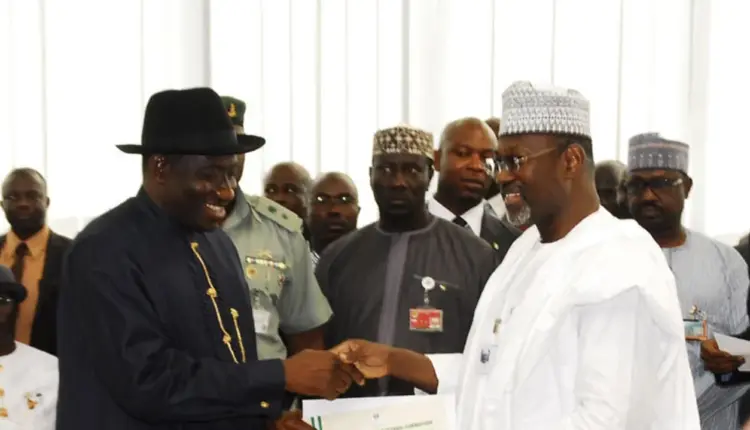Former President Goodluck Jonathan and former Chairman of the Independent National Electoral Commission (INEC), Professor Attahiru Jega have raised concerns over political interference in the appointments of electoral commissioners.
Jonathan and Jega expressed their displeasure on Tuesday when they addressed attendees at a conference hosted by the pro-democracy and advocacy organisation Yiaga Africa, in Abuja.
At the event titled ‘Reflection Conference on Democratic Elections in West Africa,’ Jonathan said, “In Nigeria, you can’t get an accurate count of votes because I believe that we have too many ghost voters.
“We must have credible people. From what (ex-INEC Chairman, Attahiru) Jega said, political leaders who are so domineering will pressurise you to do what is wrong; you should be able to resign and leave. You should be able to resign and walk away, please.
“If we don’t have this kind of people, then we are in trouble. And I don’t want any INEC official to say I was pressurised. If you are accepting to be Chairman of INEC or to be a commissioner of INEC, then you should be ready to say, ‘If I’m pressurised to do what is wrong, I will take care of the democratic people and walk away’.
“And if we don’t have such people managing our electoral management bodies, if what we have are people who will continue to go in a circle, we will not get what we want.”
Jonathan further underscored the necessity of strong and ethical leadership in electoral management to avoid a flawed electoral system and advocated for a robust framework to ensure credible elections.
“When both parties are strong, and the system cannot be manipulated, only real human beings will cast and their votes will count,” he affirmed.
The former President condemned the regionalisation of the electoral process which has affected all facets, including religious groups.
“Sometimes, if I listen to the prediction by religious men and women and so on, their predictions tend to go towards the regional interest. So, when the electoral process is so regionalised, we are going to have issues. And that will be controlled by de-emphasising sort of key areas.”
He also pointed to the challenges confronting elections in Sierra Leone and Senegal, where allegations of irregularities, including voter intimidation, ethnic tensions, and controversial results undermined the polls.
“Late last year, Ghana conducted general elections which were indeed successful, despite the application of limited technology. The country, with a reputation of being one of Africa’s most stable democracies, lived up to this billing by conducting peaceful polling and smooth transfer of power.
“The Electoral Commission of Ghana and the security authorities played a crucial role in ensuring the elections were free, fair, and transparent, thereby demonstrating that Ghana’s democratic institutions and processes have continued to be resilient, even with limited technology.
“Two other countries, Liberia and Senegal also conducted general elections with limited deployment of technology. In these countries, the processes were generally peaceful, transparent, and credible with a high voter turnout.
“In the case of Liberia, incumbent President George Weah conceded defeat to the opposition candidate Joseph Boakai after a closely contested runoff, setting a positive example for democratic transitions in the region.
“The pre-election period in Senegal was notably marred by protests, arrests of opposition figures, and concerns about the independence of the judiciary. However, it was pleasing to observe that once the election process kicked in, the polling processes progressed without hitches, resulting in a free and fair outcome.’’
For his part, Prof. Jega highlighted persistent challenges limiting democratic development in West Africa.
“Political interference in the appointment (and/or removal) of electoral commissioners and other electoral management body officials; intimidation/targeting of electoral officials to ensure desired outcomes; obstruction of legal reforms to extend EMB powers (for example to strengthen oversight of campaign finance) or more broadly provide for more inclusive electoral processes.
“Introduction of rules that enable fraud or manipulation, for example through weak regulations around registration or voting procedures, or strategic changes to electoral laws which significantly favour incumbents.
“The withholding of funds and other resources from electoral operations and attempts to discredit the EMB,” Jega stated.
He added that citizens, civil society organisations, and change drivers should continue mobilising effectively for credible elections.
We’ve got the edge. Get real-time reports, breaking scoops, and exclusive angles delivered straight to your phone. Don’t settle for stale news. Join LEADERSHIP NEWS on WhatsApp for 24/7 updates →

